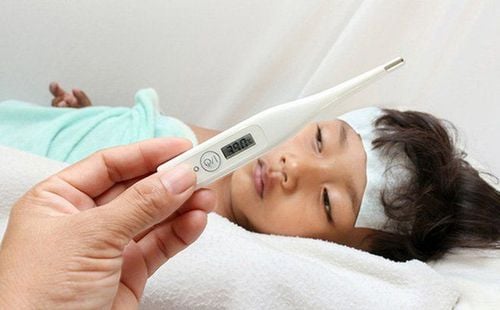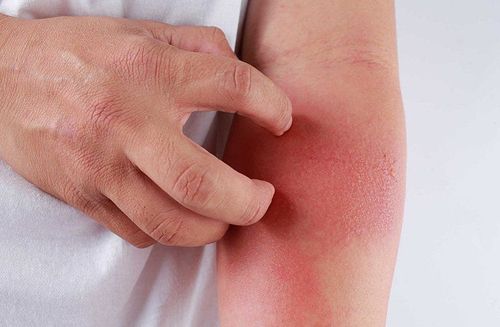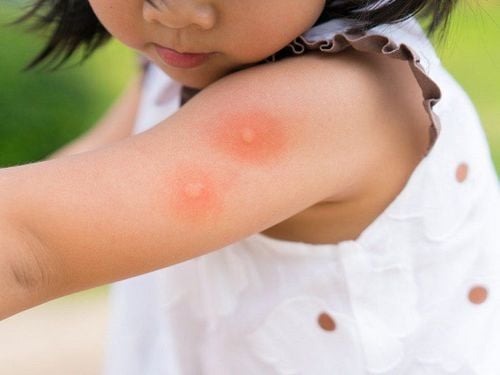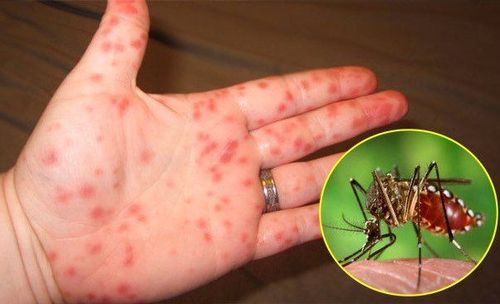This is an automatically translated article.
The article is professionally consulted by Master, Doctor Nguyen Thi Nhat - Infectious Disease Specialist - Department of Medical Examination & Internal Medicine - Vinmec Hai Phong International General Hospital.
Dengue hemorrhagic fever is an infectious disease caused by vectors transmitted through the bite of an infected mosquito. Dengue hemorrhagic fever virus has 4 types corresponding to 4 serotypes: DEN-1, DEN-2, DEN-3 and DEN-4.
1. What is Dengue hemorrhagic fever?
Dengue hemorrhagic fever (DHF) is a dangerous infectious disease, transmitted by the bite of a mosquito carrying the disease virus (like Aedes aegypti mosquito). The disease often breaks out into epidemics in the rainy season, mainly concentrated in areas with unsanitary conditions, many ponds with standing water. This is a favorable environment for the reproduction and development of mosquitoes. In the past, children were the main subjects of Dengue hemorrhagic fever, but now many adults also get the disease and the risk of death is quite high. To date, there is no specific medicine to treat Dengue hemorrhagic fever. If the disease is mild, the patient may recover on their own after about a week. For severe cases, the main treatment is antipyretic, intravenous fluids and aggressive anti-shock.Symptoms of Dengue hemorrhagic fever are similar to flu, usually lasting about 2-7 days. After being bitten by an infected mosquito, symptoms are usually not immediately apparent but are followed by an incubation period of 4 to 10 days. High fever (40°C) is typical of dengue fever, accompanied by at least two of the following, including:
Skin rash Headache Eye socket pain Nausea, vomiting Swollen lymph nodes Pain fatigue of muscles, bones and joints. The severe complication phase usually occurs 3-7 days after symptom onset. At this time, the body temperature drops, but that does not mean that the patient is recovering. Conversely, the patient should be actively monitored, because the disease is at risk of progressing to severe dengue, especially with the following warning signs:
Acute abdominal pain Persistent vomiting Bleeding legs teeth Vomiting blood Rapid breathing, shortness of breath Fatigue, restlessness, exhaustion. When Dengue hemorrhagic fever is suspected to be severe, the patient should be taken immediately to the nearest medical facility for timely treatment, because:
Plasma leakage can lead to shock, fluid retention, failure Respiratory; Heavy bleeding; Severe organ failure. These symptoms can lead to death if the patient is not treated properly and promptly.

2. How many types of virus cause dengue fever?
Dengue hemorrhagic fever is caused by one of four closely related but antigenically different virus serotypes, designated DEN-1, DEN-2, DEN-3, and DEN-4. This virus belongs to the genus Flavivirus. Patients infected with a virus will develop lifelong immunity to that virus, but the body can only fight off the virus serotype. Therefore, patients can have Dengue hemorrhagic fever more than once in their life due to different virus serotypes, especially those living in dengue endemic areas.The geographical spread of mosquito and viral vectors has led to an increase in disease prevalence over the past decades, as well as the potential for outbreaks and increasingly complicated evolution by different blood types. Dengue virus strains vary in urban areas in the tropics.
Mosquitoes are considered to be the main vectors of the disease. This type of mosquito usually gathers in muddy places, standing water around the house, damp, dark areas in the house.
3. What to do if dengue fever is suspected?

Ask the patient's epidemiological history who has traveled to, or been in, dengue-endemic areas. Clinical signs and symptoms. Blood test results for Dengue NS1 antigen from day 3 to day 5 and Dengue virus antibodies (Dengue IgM and Dengue IgG). The diagnosis of dengue can be difficult, because the symptoms of the disease can be easily confused with other conditions with similar symptoms, such as malaria, viral fever or typhoid fever. weld.
Pediatrics department at Vinmec International General Hospital is the address for receiving and examining diseases that infants and young children are susceptible to: viral fever, bacterial fever, otitis media, pneumonia in children, .... With modern equipment, sterile space, minimizing the impact as well as the risk of disease spread. Along with that is the dedication from the doctors with professional experience with pediatric patients, making the examination no longer a concern of the parents.
Master. Doctor. Nguyen Thi Nhat has more than 10 years of experience in the field of artificial kidney, and in the field of infectious diseases, examination and management of patients with kidney disease and infectious diseases. Currently working as a Doctor of Infectious Diseases, Department of General Internal Medicine, Vinmec Hai Phong International General Hospital
Please dial HOTLINE for more information or register for an appointment HERE. Download MyVinmec app to make appointments faster and to manage your bookings easily.














